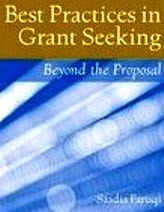There’s a saying in the nonprofit sector: if you’re in this, it’s not to become rich. To prove this saying wrong, many grant writers decide to freelance... perhaps because they think it will allow them the freedom to earn more money than working as an employee at a nonprofit organization. Yet years later they are no better than when they started, searching for high-paying clients, struggling with freaky organizational dynamics of staff and volunteers, and hoping for a vacation. What is it, then, that separates the average grant writing consultant from those few who earn exorbitant amounts of money and recognition in their field? Oh yes, we all know who I am referring to!
Here are some traits of grant writing consultants who achieve not only professional success for themselves but also for their clients:
- They are Selective. They don’t sign a contract with just anybody who walks through their doors. They develop a strict criteria for judging the feasibility of a potential client, ranging from their grant readiness to their financial soundness and board personality. They meet with prospective clients on-site to take a look at their organizational dynamics and method of operations. They discuss what the client needs and how they can best help before making any decisions.
- They are Proactive. Once a client has been signed on, they aggressively pursue grant opportunities rather than wait for the client to bring them applications or proposal ideas. They use their own databases to search for grants that may be available for programs or projects, both new and ongoing. They meet with program staff to discuss wish-lists, program needs, financial issues and the like to get a better understanding of what opportunities may be availed. They schedule frequent meetings with not just the person they report to but also the program and accounting staff. They sit in on programs to get a first-hand view of what is being done. They don’t wait until the client calls them for something – and they definitely don’t wait for a fire to start before jumping to action.
- They are Resourceful. They think outside the box, and they try to keep ahead of the competition by searching for non-conventional ways of seeking grants. They consider methods other than grant writing to complement their grant writing efforts, preferring to use planned giving, matching gifts, corporate sponsorships etc, in a holistic environment to improve grant awards. They create relationships with funders as well as with other nonprofit organizations that may benefit from partnerships with their current clients. They act as a coordinator of these relationships rather than force them upon the respective parties. They search for best practices in the field of grant seeking and help their clients implement them. They motivate and energize board members and bring in volunteers to help in the grant seeking effort.
- They are Organized. They have to be, with multiple clients and projects to keep track of. They use sophisticated tracking systems to ensure that they don’t forget deadlines or meetings. Although this tracking may be done on paper or Excel spreadsheet, the systems they design to ensure that nothing falls through the cracks are fool-proof. They certainly don’t rely on client staff to remind them of things that need to be done.
- They are Visible. They don’t hide behind their computers all day, and they don’t spend all day wearing pajamas in their home office. They utilize their time to conduct trainings or seminars, and they speak at monthly meetings of local professional associations. They create websites that not only inform the public of their expertise but also offer value-added in the form of blogs, webcasts and e-books. They write articles for related publications that potential clients may read. And they provide pro bono services to deserving nonprofits that truly serve the causes they are passionate about.
- They are Writers. It goes without saying of course that successful grant writing consultants know their way blindfolded through the grant seeking process, from research to writing to follow-up. They have talked with enough foundation officials to know what works and what doesn’t, and they use that knowledge to write superior proposals that stand out among the thousands. They have a way with words that the average grant writer just does not.
So do you have any of these traits? Or are you willing to develop them to earn more success? Send us your stories or suggestions.





No comments:
Post a Comment